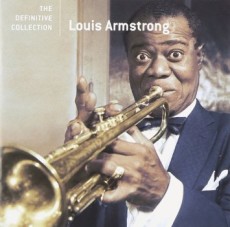
Daily Dose Of Jazz…
Louis Armstrong was born on August 4, 1901 in New Orleans, Louisiana and grew up in the poverty-stricken, rough neighborhood known as “The Battlefield”, which was part of the Storyville legal prostitution district. Abandoned by his father while still an infant, he and his sister lived with relatives for a period of years. He attended the Fisk School for Boys, getting his early exposure to music, worked as a paperboy, discarded food reseller, and hauled coal to the brothels and clubs and worked for a Jewish junk haulers who treated him like family.
Dropping out of school at age eleven, Louis joined a quartet of boys singing on the corner for money, and listened to the bands in Storyville. He developed his cornet playing skills by playing in the band of the New Orleans Home for Colored Waifs under the tutelage of Professor Peter Davis who instilled discipline in and provided musical training to the otherwise self-taught Armstrong. He eventually became the bandleader, they played around New Orleans and by thirteen-year-old he began drawing attention by his cornet playing, starting him on a musical career. At fourteen he got his first dance hall job at Henry Ponce’s where Black Benny became his protector and guide. He hauled coal by day and played his cornet at night.
Over the next years he played in the city’s frequent brass band parades and listened to older musicians every chance he got, learning from Bunk Johnson, Buddy Petit, Kid Ory and Joe “King” Oliver, who acted as a mentor and father figure to the young musician. He toured with Fate Marable, replaced King Oliver in Kid Ory’s band, and was second trumpet in the Tuxedo Brass Band.
1922 saw Armstrong in Chicago joining King Oliver’s Creole Jazz Band when the city was the center of the jazz universe. He was challenged to “cutting contests” by hornmen trying to displace the new phenomenon, which could blow two hundred high Cs in a row. He made his first recordings on the Gennett and Okeh labels, he met Hoagy Carmichael through his friend Bix Beiderbecke. Taking the advice of second wife Lil Harden Armstrong, he left Oliver and went to work with Fletcher Henderson in New York and developing his own style. By 1924 he switched to trumpet and his influence upon Henderson’s tenor sax soloist Coleman Hawkins, can be judged by listening to the records made by the band during this period.
During this time, Armstrong made many recordings on the side, arranged by Clarence Williams, with the Williams Blue Five pairing him with Sidney Bechet and backing Bessie Smith, Ma Rainey and Alberta Hunter. He began recording under his own name for Okeh with his famous Hot Five and Hot Seven groups Hot Five and Hot Seven groups, producing hits Potato Head Blues, Muggles and West End Blues, the music of which set the standard and the agenda for jazz for many years to come. His recording of Heebie Jeebies turned on both black and white young musicians to his new type of jazz, including a young Bing Crosby.
Over the course of his career he appeared in musical, played clubs, added vocals to his repertoire covering most famously Carmichael’s Stardust that became one of the most successful renditions. His approach to melody and phrasing was radical and evolved into scat singing. As with his trumpet playing, Armstrong’s vocal innovations served as a foundation stone for the art of jazz vocal interpretation. The uniquely gritty coloration of his voice became a musical archetype that was much imitated and endlessly impersonated.
After spending many years on the road, in 1943 Louis settled permanently in Queens, New York in 1943 in contentment with his fourth wife, Lucille. During the subsequent thirty years, he played more than three hundred gigs a year, toured Africa, Europe, and Asia under sponsorship of the US State Department earning the nickname “Ambassador Satch” and inspiring Dave Brubeck to compose his jazz musical The Real Ambassadors.
He has been honored posthumously with a Grammy Lifetime Achievement Award, won a Male Vocal Performance Grammy for Hello Dolly, has 11 recordings inducted into the Grammy Hall of Fame, the Rock and Roll Hall of Fame list his West End Blues as one of the 500 songs that shaped Rock and Roll, had a commemorative U.S. postage stamp issued, and has been inducted into six Halls of Fame, has a star on the Hollywood Walk of Fame, as well as the Louis Armstrong New Orleans International Airport, the US Open main stadium was renamed Louis Armstrong Stadium, and his Hot Five and Hot Seven recordings are now a part of the National Recording Registry in the Library of Congress.
Trumpeter and vocalist Louis Armstrong, also known as Satchmo, Dipper, Pops and the King of Jazz, passed away in his sleep of a heart attack on July 6, 1971. His honorary pallbearers included Bing Crosby, Ella Fitzgerald, Dizzy Gillespie, Pearl Bailey, Count Basie, Harry James, Frank Sinatra, Ed Sullivan, Earl Wilson, Alan King, Johnny Carson and David Frost. Peggy Lee sand The Lords Prayer, Al Hibbler sang Nobody Knows The Trouble I’ve Seen and his long-time friend Fred Robbins gave the eulogy.


